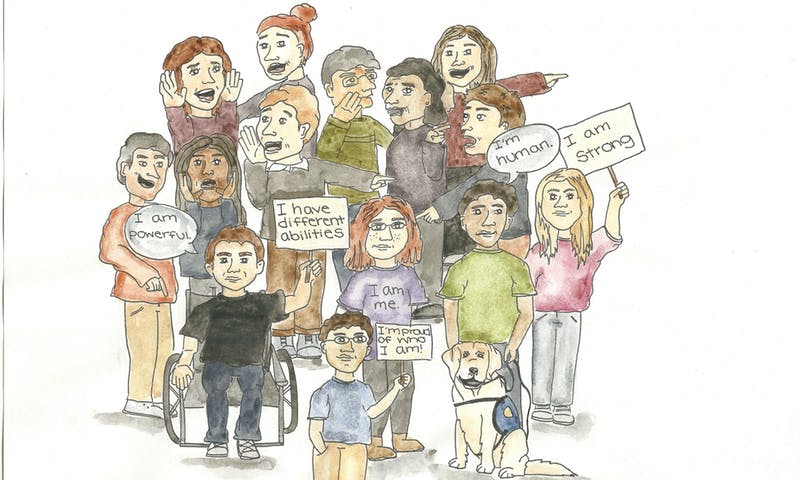Gig Economy Compounds Problems for Disabled Workers, Azza Altiraifi Says | Bloomberg
In this edition of “Bloomberg Equality,” Azza Altiraifi, Disability Justice Initiative research associate, discusses the challenges and biases that permeate the gig economy with Bloomberg’s Scarlet Fu on “Bloomberg Markets: The Close.” (Source: Bloomberg)
International Survivors of Suicide Loss Day | American Foundation for Suicde Prevention
In 1999, Senator Harry Reid, who lost his father to suicide, introduced a resolution to the United States Senate which led to the creation of International Survivors of Suicide Loss Day. Also known as Survivor Day, the day was designated by the United States Congress as a day on which those affected by suicide can join together for healing and support. It was determined that Survivor Day would always fall on the Saturday before American Thanksgiving, as the holidays are often a difficult time for suicide loss survivors.
Each year, the American Foundation for Suicide Prevention supports hundreds of large and small Survivor Day events around the world, in which suicide loss survivors come together to find connection, understanding and hope through their shared experience. While each event is unique and offers various programming, all feature an AFSP-produced documentary that offers a message of growth, resilience and connection.
Fluidity in disability: Exploring the spectrum of language, identity | The Daily Cardinal
If language is an expression of identity, why does it often favor able-bodied folx? When it comes to disabilities, mental health or chronic illnesses, a label is  prescribed to the individual whether they control it or not. While some can open doors to support and treatment, others can confine people into boxes built on ableist assumptions. This language, in turn, can force people with disabilities to be isolated to society’s view of themselves and limits the words they use to describe their experiences. Words have the ability to oppress or empower individuals — what we don’t realize is how our language can be extremely harmful and perpetuate binaries. Therefore, through this ableist lens, “normal” is valued, while difference in experience is “othered.” Society has become increasingly aware of racist, sexist, homophobic language, but ablesist language is too often disregarded.
prescribed to the individual whether they control it or not. While some can open doors to support and treatment, others can confine people into boxes built on ableist assumptions. This language, in turn, can force people with disabilities to be isolated to society’s view of themselves and limits the words they use to describe their experiences. Words have the ability to oppress or empower individuals — what we don’t realize is how our language can be extremely harmful and perpetuate binaries. Therefore, through this ableist lens, “normal” is valued, while difference in experience is “othered.” Society has become increasingly aware of racist, sexist, homophobic language, but ablesist language is too often disregarded.
In traditional language, there is no word for disability | The Guardian AU
By any measure Australia’s First Peoples with disabilities are among some of the most disadvantaged people in Australia today. This is because they often face discrimination based on their Aboriginality and/or disability. Meeting the needs of First Peoples with disabilities is one of the most urgent and critical social justice issues in Australia today.
Without a Wawa manager’s decision 40 years ago, 500 special-needs adults wouldn’t have jobs today | Philadelphia Inquirer
“They call me the ‘sample king,’ ” said John Mitchell as he carried a tray of Wawa smoothie samples — mini cups of frothy treats with fun names like Graveyard Smash and Spellbound Strawberry — to the front of the store on a pre-Halloween morning and began hawking them to customers. “Graveyard Smash, Graveyard Smash! Enjoy a spectacular treat in time for Halloween!” he called out. Then, “Catch the spell of the Spellbound Strawberry! Free samples!”
Many Americans Over 65 Face Economic Insecurity, Even If They’re Healthy | Bloomberg
The majority of Americans living alone are at risk of not being able to pay for basic needs.That’s according to new estimates of financial insecurity among Americans 65 and older from the Gerontology Institute at the University of Massachusetts Boston.
Report Finds Adults With Disabilities Remain Outside The Economic Mainstream | PR Newswire
Today, National Disability Institute (NDI) released the new report, Banking Status and Financial Behaviors of Adults with Disabilities: Findings from the 2017 FDIC National Survey of Unbanked and Underbanked Households. The report finds that, in the 29 years since the landmark Americans with Disabilities Act (ADA) was signed into law, ensuring all individuals with disabilities the opportunity to achieve “economic self-sufficiency,” this population still faces numerous financial hurdles and roadblocks to financial inclusion.
For the First Time, Disability Rights Are a Major Campaign Issue | Rewire.News
As presidential hopefuls vie for voter support during an election season, they usually focus on specific, although often overlapping, demographic groups, including people of color, suburban women, and middle-class voters. Until this election, candidates have mostly overlooked disabled people as a crucial voting bloc. But, the tides may be shifting ahead of the 2020 election, as some are recognizing the importance of the disability vote by centering disability rights in their platforms.
Adults Diagnosed with Autism late in life reveal how They felt like “Bad” People: “I’d always felt like this Alien’ | Newsweek
https://www.youtube.com/watch?v=YIK2yXfrCfw
People diagnosed with autism later in life have revealed how not knowing for decades that they had the condition made them feel “alien” and like “bad” people. The condition can be diagnosed at the age of 18 months, with a series of behavioral and developmental tests. However, autism was first included in the manual of mental disorders used by qualified health professionals in 1983, meaning those who grew up before this time went under diagnosed or misdiagnosed, researchers explained in a study published in the journal Health Psychology and Behavioral Medicine.
Stacey Abrams Kicks Off DNC Panel On Voter Suppression In Disabled, Minority Communities |GPB News
The Atlanta Democrat began her remarks with a tongue-in-cheek disclaimer: “My name is Stacey Abrams and I am not the governor of Georgia.” Abrams delivered her remarks as she kicked off a panel discussion about voter suppression across the country and in Georgia and its disproportionate impact on disabled voters and non-white voters.
Mindset Matters: How The Image of Disability Impacts The Corporate Bottom Line | Forbes
Mindset Matters is going to use the next several columns to take a deep dive into the world of image and perception and how that directly effects business and the overall culture. There is a direct correlation to the value proposition and economic realities of persons with disabilities based on how they are perceived across the mainstream culture. The upcoming columns will focus on industries like film, television, advertising and fashion where it is not only image that drives perception but shapes our cultural understanding of what is considered acceptable.
Study: Older, Less Healthy Mexican Americans Screened Away From Medicare Advantage Plans | KJZZ
Medicare Advantage plan providers have long been accused of cherry picking healthier patients in an effort to reduce costs. A study published in the Journal of the American Geriatrics Society and led by Northern Arizona University researcher Amit Kumar echoes that idea among a particular group of patients: older Mexican Americans. The number of Americans enrolled in a Medicare Advantage plan has nearly doubled over the last decade reaching 22 million enrollees in 2019, according to the Kaiser Family Foundation, a nonprofit health information organization.
 Lastly, This week we are sending warm wishes to everyone for a festive holiday! Happy Thanksgiving!
Lastly, This week we are sending warm wishes to everyone for a festive holiday! Happy Thanksgiving!
The information and links provided here are a courtesy. The National Advisory Board does not necessarily endorse or share the views contained in any article, report or web site. No link provided here should be considered an endorsement of any opinion, product or service that may be offered in the article or at the linked-to site.

